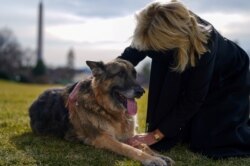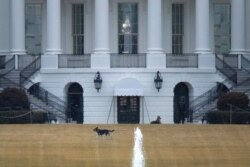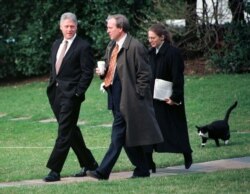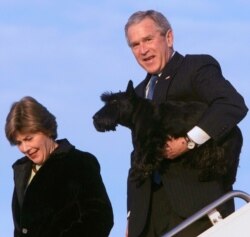Bad dog. That is the collective scolding directed at Major, the youngest of the Bidens’ two German shepherds, after he apparently bit someone at the White House.
Major was involved in a “biting incident” with a member of White House security, according to CNN.
The dog on Monday “was surprised by an unfamiliar person and reacted in a way that resulted in a minor injury to the individual, which was handled by the White House medical unit with no further treatment needed,” White House press secretary Jen Psaki informed reporters on Tuesday.
But she declined to confirm whether the incident involved a member of the presidential protective detail.
The Secret Service referred an inquiry from VOA to the White House press office. It directed the query to the office of first lady Jill Biden, which did not respond with further details. During the briefing, Psaki said she encouraged reporters to ask the Secret Service about the identity of the person injured.
That exchange had some reporters feeling like a dog chasing its tail.
Major, along with his elder companion, Champ, are temporarily back in President Joe Biden’s home state of Delaware on a pre-planned stay in the care of family friends during the first lady’s visits early this week to military bases in the states of California and Washington.
The dogs are “still getting acclimated and accustomed to their new surroundings and new people,” Psaki said at Tuesday’s White House briefing.
“Any change in environment can result in a change in behavior,” according to Cornell University Professor Emeritus Katherine Houpt, a veterinary behaviorist. “My guess is that the dog probably was showing mild signs back in Delaware, and then in this very exciting, challenging environment” of the White House.
“There’s a dog bed leaning against a wall outside the White House,” Jordan Fabian, a correspondent for Bloomberg, noted in a tweet Tuesday morning.
Reporters were barking up the wrong tree if they took that as an indication the dogs had been given one-way tickets to Delaware, White House officials quickly assured reporters.
“The dogs will return to the White House soon,” Psaki promised.
Rescue dogs
Champ and Major have been observed off-leash with the Bidens outside the White House. The president recently noted that the pair have walk-in privileges for the Oval Office. They are the first rescue dogs to live at the White House, which has more than seven acres of mostly outdoor space, where there are numerous squirrels and other rodents.
Champ is at least 13 years old and slowed by age. Major, at 3 years old, was adopted from a Delaware animal shelter. According to media reports, he has been known to become agitated — jumping, barking and charging at some staff members.
“Anyone who had to give up a purebred dog, for whom they probably paid thousands of dollars, means that there must have been a problem with [Major],” Houpt told VOA.
One reporter on Tuesday asked Psaki to assure the nation that Major would not be euthanized for his bad behavior.
“Certainly, Major Biden is a member of the family, so I can assure you that,” she replied.
Major was in the headlines last November when the then-president-elect tripped on a rug that slid while playing with the dog, resulting in hairline fractures in Biden’s foot and leaving him in a corrective boot until the injury healed.
Major and Champ have generated significant media interest after a four-year absence of pets at the White House while Donald Trump was president.
German shepherds, as a large breed intended for guard work, require special attention.
“So, it’s not surprising that if you're going to have a problem, it's going to be aggression to strangers,” said Houpt. “And of course, putting the dog in an environment with so many strange people” — and some of them being imposing-looking security personnel — “that’s more of a threat to the dog.”
The Bidens could get outside assistance for Major, whose aggression may be fear-based, Houpt added.
“There are several veterinary behaviorists in the Washington, D.C., area, so they should probably make use of their talents. And the dog needs behavior modification and maybe even psycho-pharmacological treatment to reduce his aggression,” the Cornell professor advised.
“It will only take five minutes a day to practice his obedience,” she added. “And if they're really worried, it will be better to muzzle the dog. It won't make him worse. It won't make him better. But it will protect the public.”
The situation could be further complicated by the arrival of a cat. The Bidens announced last November that a feline would also join them at the White House, an apparent attempt to bridge the national divide between dog and cat lovers.
The most famous “first cat” in modern times was Socks, a stray adopted by President Bill Clinton and first lady Hillary Clinton.
During the presidency of George W. Bush, the White House was home to three dogs and a cat. They made way for two Portuguese water dogs during President Barack Obama's administration.
Bush’s Scottish terrier, Barney, was known to have sunk his teeth into two people, including nipping the right index finger of then-Reuters reporter Jon Decker, who had tried to pet the first dog during the canine’s morning walk on White House grounds.
“It did not dissuade me from petting presidential dogs,” Decker, now a White House correspondent for Gray TV, told VOA.
“Barney was a good dog,” he said, despite the incident which required him to get a tetanus shot.
Sunny, one of the Obama dogs, bit the face of a family guest who tried to kiss her. The 18-year-old woman, after being examined by the White House physician, was told to get stitches.
Trump, according to White House historians, was the first president since James Polk in 1849 not to have a pet while in office.
White House menagerie
Most of the presidential pets have been cats or dogs. But President Theodore Roosevelt, who had six children, had numerous dogs, a one-legged rooster, guinea pigs, a lizard, a rabbit, a snake, a hyena, a pony and a brown bear.
One of the dogs, a bull terrier named Pete, bit numerous people and ripped the pants of the French ambassador, according to historians.
The John F. Kennedy White House also took on the trappings of a small zoo, with dogs, cats, birds, hamsters, a white rabbit named Zsa Zsa and a pony named Macaroni — a gift for daughter Caroline from Vice President Lyndon Johnson.










